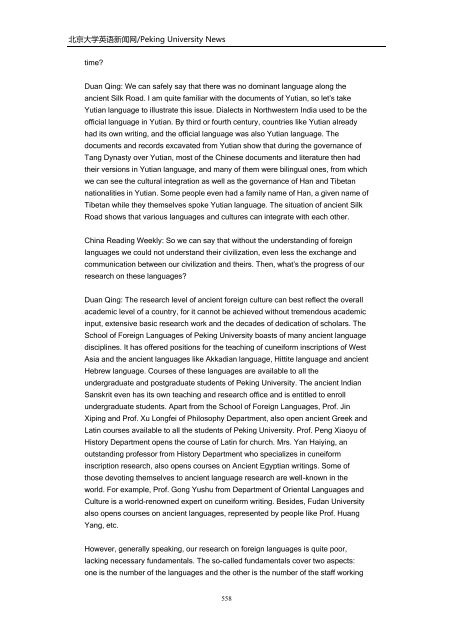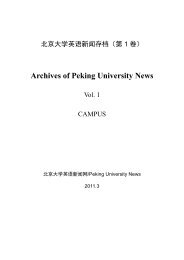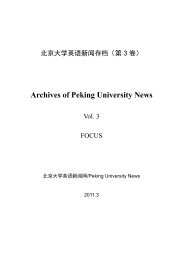Archives of Peking University News - PKU English - 北京大学
Archives of Peking University News - PKU English - 北京大学
Archives of Peking University News - PKU English - 北京大学
Create successful ePaper yourself
Turn your PDF publications into a flip-book with our unique Google optimized e-Paper software.
<strong>北京大学</strong>英语新闻网/<strong>Peking</strong> <strong>University</strong> <strong>News</strong><br />
time?<br />
Duan Qing: We can safely say that there was no dominant language along the<br />
ancient Silk Road. I am quite familiar with the documents <strong>of</strong> Yutian, so let‘s take<br />
Yutian language to illustrate this issue. Dialects in Northwestern India used to be the<br />
<strong>of</strong>ficial language in Yutian. By third or fourth century, countries like Yutian already<br />
had its own writing, and the <strong>of</strong>ficial language was also Yutian language. The<br />
documents and records excavated from Yutian show that during the governance <strong>of</strong><br />
Tang Dynasty over Yutian, most <strong>of</strong> the Chinese documents and literature then had<br />
their versions in Yutian language, and many <strong>of</strong> them were bilingual ones, from which<br />
we can see the cultural integration as well as the governance <strong>of</strong> Han and Tibetan<br />
nationalities in Yutian. Some people even had a family name <strong>of</strong> Han, a given name <strong>of</strong><br />
Tibetan while they themselves spoke Yutian language. The situation <strong>of</strong> ancient Silk<br />
Road shows that various languages and cultures can integrate with each other.<br />
China Reading Weekly: So we can say that without the understanding <strong>of</strong> foreign<br />
languages we could not understand their civilization, even less the exchange and<br />
communication between our civilization and theirs. Then, what‘s the progress <strong>of</strong> our<br />
research on these languages?<br />
Duan Qing: The research level <strong>of</strong> ancient foreign culture can best reflect the overall<br />
academic level <strong>of</strong> a country, for it cannot be achieved without tremendous academic<br />
input, extensive basic research work and the decades <strong>of</strong> dedication <strong>of</strong> scholars. The<br />
School <strong>of</strong> Foreign Languages <strong>of</strong> <strong>Peking</strong> <strong>University</strong> boasts <strong>of</strong> many ancient language<br />
disciplines. It has <strong>of</strong>fered positions for the teaching <strong>of</strong> cuneiform inscriptions <strong>of</strong> West<br />
Asia and the ancient languages like Akkadian language, Hittite language and ancient<br />
Hebrew language. Courses <strong>of</strong> these languages are available to all the<br />
undergraduate and postgraduate students <strong>of</strong> <strong>Peking</strong> <strong>University</strong>. The ancient Indian<br />
Sanskrit even has its own teaching and research <strong>of</strong>fice and is entitled to enroll<br />
undergraduate students. Apart from the School <strong>of</strong> Foreign Languages, Pr<strong>of</strong>. Jin<br />
Xiping and Pr<strong>of</strong>. Xu Longfei <strong>of</strong> Philosophy Department, also open ancient Greek and<br />
Latin courses available to all the students <strong>of</strong> <strong>Peking</strong> <strong>University</strong>. Pr<strong>of</strong>. Peng Xiaoyu <strong>of</strong><br />
History Department opens the course <strong>of</strong> Latin for church. Mrs. Yan Haiying, an<br />
outstanding pr<strong>of</strong>essor from History Department who specializes in cuneiform<br />
inscription research, also opens courses on Ancient Egyptian writings. Some <strong>of</strong><br />
those devoting themselves to ancient language research are well-known in the<br />
world. For example, Pr<strong>of</strong>. Gong Yushu from Department <strong>of</strong> Oriental Languages and<br />
Culture is a world-renowned expert on cuneiform writing. Besides, Fudan <strong>University</strong><br />
also opens courses on ancient languages, represented by people like Pr<strong>of</strong>. Huang<br />
Yang, etc.<br />
However, generally speaking, our research on foreign languages is quite poor,<br />
lacking necessary fundamentals. The so-called fundamentals cover two aspects:<br />
one is the number <strong>of</strong> the languages and the other is the number <strong>of</strong> the staff working<br />
558




